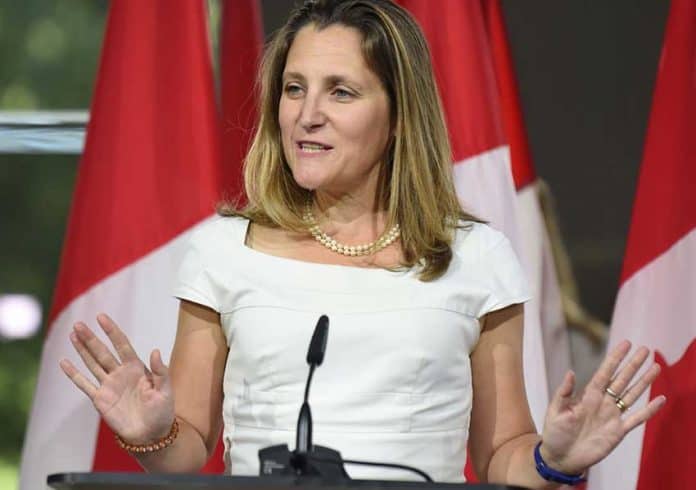United States President Donald Trump told the U.S. Congress today that his administration intends to sign a revised trade agreement in 90 days with Mexico — and Canada, if the latter “is willing.”
But Canada’s willingness appears to depend on whether it will accept U.S. terms that appear non-negotiable.
Trump announced Monday that the United States and Mexico had reached an updated pact that he said could exclude Canada.
Negotiations to bring Canada into the deal followed but failed to meet the deadline Trump set for today. However, United States and Canadian officials will return to the bargaining table next week.
United States Trade Representative (USTR) Robert Lighthizer announced Trump’s notification to Congress via a statement.
“Today the president notified the Congress of his intent to sign a trade agreement with Mexico – and Canada, if it is willing – 90 days from now. The agreement is the most advanced and high-standard trade agreement in the world. Over the next few weeks, Congress and cleared advisors from civil society and the private sector will be able to examine the agreement. They will find it has huge benefits for our workers, farmers, ranchers, and businesses,” Lighthizer said.
“We have also been negotiating with Canada throughout this year-long process. This week those meetings continued at all levels. The talks were constructive, and we made progress. Our officials are continuing to work toward agreement. The USTR team will meet with [Foreign] Minister [Chrystia] Freeland and her colleagues Wednesday of next week.”
Seemingly at odds with Lighthizer’s “constructive” claim was a transcript of off-the-record remarks President Trump made to the Bloomberg news agency yesterday. It was obtained by Canadian newspaper The Toronto Star, and indicated that no compromises will be offered to Canada.
Trump said a deal with Canada would be “totally on our terms,” according to The Star, citing an anonymous source, and that Canadians would have “no choice” but to go along with the deal because they would fear Trump might impose auto tariffs.
Today, Trump responded to the leak on Twitter, writing:
“Wow, I made OFF THE RECORD COMMENTS to Bloomberg concerning Canada, and this powerful understanding was BLATANTLY VIOLATED. Oh well, just more dishonest reporting. I am used to it. At least Canada knows where I stand!”
Trump’s remarks to Bloomberg further complicated today’s talks between the United States and Canada but it is unclear whether they had any bearing on the failure to reach an agreement.
Some analysts said earlier in the week that the notion that the two countries could reach a deal today after less than a week of separate talks was too ambitious.
Mexico’s Secretariat of Foreign Affairs (SRE) and the Secretariat of Economy (SE) said in a joint statement that “the notification sent by the United States represents a step forward in the understandings reached between Mexico and the U.S. in relation to NAFTA.”
They also said the “government of Mexico will continue to closely monitor” the negotiations between the United States and Canada and “it would continue promoting an agreement of which Canada is part.”
The statement concluded by saying that “the understandings reached with respect to NAFTA will promote employment, competitiveness and trade in the North American region.”
Dispute settlement, Canada’s cultural exception and access to its dairy markets remain obstacles to a trilateral deal, the Canadian newspaper The National Post reported today.
Negotiations reportedly ran into trouble late last night when Lighthizer would not give in to Canada’s demand to maintain an independent trade dispute mechanism despite offers to make concessions on intellectual property and to give more open access to the Canadian dairy market.
Mexico agreed to its elimination but the Canadian government sees it as a vital means with which to fight U.S. duties it sees as unfair, especially those on softwood lumber and paper.
A source told the newspaper The Globe and Mail that “Canada will need some sort of understanding with the U.S. on the dispute resolution procedure in order to reach a high-level agreement.”
Foreign Minister Freeland told a press conference this afternoon that a “win-win-win” agreement is within reach.
“As we have said from the outset, our objective in these talks is to update and modernize NAFTA in a way that is good for Canadians, good for Americans, and good for Mexicans,” she said.
“With goodwill and flexibility on all sides I know we can get there but . . . I’m paid in Canadian dollars and my job is to ensure that this agreement works for Canadian workers, Canadian families and Canadian business,” Freeland continued.
Source: The Globe and Mail (en), El Financiero (sp), The National Post (en)
